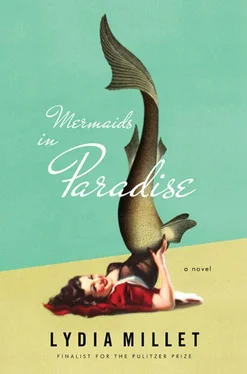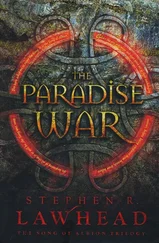“I’m not going to wuss out,” protested Chip. “Babe. Babe! Are you kidding?”
“It wouldn’t be wussing ,” I said. I hated the thought of Chip with a tattoo on his head. Till death do us part, and all, but with the head tattoo I wasn’t sure. It didn’t appeal to me. “Not in the least. This would be more like, you doing me a solid.”
“Now honey,” said Chip, de-storking his muscular legs and coming over to put his arms around my waist, “I know you support me taking this on. It’s going to rock. It’ll totally rock, OK? You’ll see.”
When I first met Chip, on a speed-dating lark that Gina dragged me to as an ironic gesture after I’d gone through a bad breakup, I had the impression he was a handsome guy but seemingly indifferent. It turned out he wasn’t indifferent at all; when Chip gets a far-off look in his eyes it’s not coldness, it’s more like an echoing. He forgets what’s in front of him sometimes, does Chip — goes to a dreaming place, a dreaming environment. In that land flags are flying over tall-grass meadows; men are Vikings, women like ornaments on the prows of ancient ships, their hair long and wavy. Chip’s a dreamer and if he could, he’d make the world a place where questing videogames became reality, where he could wear breastplates and a deep battle horn would sound over the white-peaked mountains and lush green valleys. Stags leaping in the woods; fording of streams by warriors and their warhorses, decked out in glorious regalia; possibly mythological creatures.
But if you can’t make the world into a videogame, and if you’re not a full-on geek but fifty-percent jock too, I guess the next best thing is a mud marathon.
“I do support you, Chip,” I sighed. “Just — would you do something for me? Don’t get a head tattoo. Look at that guy. With the name of the race beneath that stubble on his scalp? He looks like he’s here to kill minorities. Chip, I don’t favor a man with head tattoos.”
“You’ve got my word on it, sweetcheeks,” said Chip. He disentangled himself from my embrace and returned to his warmup/stretching routine.
“Chip,” I went on, as he storked on his second leg and peeled back the wrapper on an energy bar that looked like something dark nestled in cat litter, “you know, while we’re on the advisability subject, I sometimes have a thought. My thought is that, with the planet at seven billion people and counting, hundreds of millions in abject poverty, my concern is that extreme sports are maybe a red herring. If people want to put so much effort into testing their toughness, if they want to prove they’re not afraid of hardship, why not travel as Good Samaritans to famine-ridden or war-torn countries? Or for the rebel, punk-rock types, maybe bomb missile factories? You know — do something productive?”
“Huh,” said Chip, looking surprised and a little worried as he chewed the protein bar with his mouth open. “Man, Deb. Should I not have booked the honeymoon package for Virgin Gorda?”
“Honey, my point is—”
But the pre-starter sounded then, a five-minute warning. Chip gulped down his soy protein, kissed me, took off his ultra-featherweight jacket, adjusted the tube on his backpack hydration kit (giving it a practice suck or two) and the angle on his headlamp, and made for the starting line. I raised my phone and called out to him as he went, snapping a picture when he turned to smile at me. He looked like a combination football player/spelunker/Green Beret, his broad grin a Cheerful Chip special.
Chip’s a positive guy, one of the things I value about him. Events don’t tend to get him down for long. He cries a lone man-tear now and then, when he sees a commercial with starving babies or remembers watching the planes hit the buildings — Chip doesn’t have a problem showing emotion — but he snaps out of it before he reaches a level that’s maudlin. Chip snaps right out of it and switches into basketball, World of Warcraft or having-sex mode. He’s quite accomplished at all three.
The hotel had screens set up where spectators could watch the feed from various cameras positioned along the route; I wasn’t sure, though, how to pick Chip out of the rest of the crowd. He’d tied a bright bandanna loosely around his neck, colored a putrid yellow-green, but it would soon be brown as Chip got mud-covered and then it would cease to distinguish him. I bought myself a drink at the ski resort bar and sat down to watch the proceedings.
The first obstacle was ropes over a pond; the runners had to walk along thin ropes strung slightly above the surface of the water, one rope per runner, like a tightrope, plus a second rope to hold on to above their heads. Several of them splashed down in rapid succession. They were falling readily from those ropes, dropping like flies. Meanwhile I slowly drank my margarita, there in the ski resort bar. There was abundant salt on the rim of the glass, and I liked that; I liked the margarita quite a bit, I realized pleasantly, as the extreme athletes balanced, then wavered wildly, as they splashed into the pond and struggled to climb out again, covered in scum.
Yes, I nodded to myself, the margarita was tasty.
Between leisurely sips I tried to make out Chip on the large screen, Chip balancing on a narrow rope or toppling into the chilly, brackish water, but I really couldn’t see him, and in the end it wasn’t worth the effort. There were so many men on those ropes, so many strong, tough men out there exemplifying toughness — surely these men were heavy as iron, with that muscle mass on them, and yet to me it almost seemed as though their bodies were puffy, as though they might suddenly rise into the air, borne heavenward like so many man-shaped muscle balloons. . a few woman balloons, here and there, but mostly it would be men.
I ordered a second margarita, then, thinking of a future time when muscular man-balloons might rise into the air, eventually popping. By the time I focused again, the ropes-over-a-brackish-pond obstacle was history and they were just running in a pack, a crowd of heads moving up and down, bobbing, some with wide grins — a pack of humanity. Some wore glued-on handlebar mustaches or Scottish kilts, others were painted all over their bodies in various colors, resembling zebras, tigers or indigenous tribesmen. One joker wore a Louis Quatorze wig.
The running part was, to me, tedious. I recalled someone saying people had perished, during other mud marathons — and more than one, even. Some people perished, in the course of proving their toughness: well, so it went.
It was a rumor, anyway; Chip said the paper they’d made him sign was purely a gimmick, a legal form known as a death waiver.
Someone remarked that it would be another ten minutes until the second obstacle, so I decided to take a walk outside to look at the party prep. The organizers were throwing a big bash after the race, with live bands and plenty of alcohol, where tattoo artists would put a tattoo on a runner’s head for less than fifty bucks. I walked across the grounds — I’d poured my second margarita into a plastic cup and carried it with me — and glanced into some of the body art tents, thinking fearfully of Chip’s scalp. A guy like Chip, if he’s in a triumphal mood, can be tempted. He’s not a rock, Chip, in the heat of the moment, when it comes to aesthetic decisions; he’s fallible. Chip’s only human. He never claimed not to be.
I saw photos displayed of armpit work, photos of naked-chested people raising their arms above their heads, and in those armpits were tattoos. In one pair of armpits there were grinning skulls, while in another two large eyes popped out to look at the viewer, one in each pit. They seemed to be the eyes of snakes, perched balefully on scaly lids. One man had women’s legs tattooed in his fishbelly-white armpits — a pair of disembodied legs in garter stockings and red high heels, one leg-pair per armpit. The legs were spread wide, one pointing up the inner arm, the other down the ribs, to reveal betwixt them both a nest of springy armpit hair.
Читать дальше












